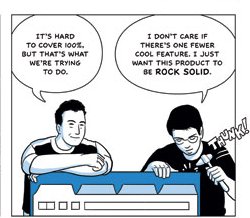Can Chrome OS save us from racket ware?


As in protection racket.
Expert users don't seem bothered by this. Expert users can avoid the racket. They fix their own registries and change their own oil. To the extent they have contempt for the user on the street, I say they're in on the racket.
We all know how it works. Windows slows down for no reason. You go online to check it out. You're told, "try this free, it will fix you up right" and you download it. You load it. It runs, and then it says "you have hundreds of problems here that must be fixed right now. But it's going to cost you."
Nice bits you got there. Shame if something happened to them.
The user then faces a choice. Buy the software -- buy it now -- or lose control of their machine to malware.
Wash, rinse, repeat.
There's always a new kind of scam coming along. There's always something that the products you own don't pick up, but this new piece of junk will. Or will claim to.
Malware locks into Windows like barnacles on a ship. If you've ever watched Windows load you know why. It's messy. There are a ton of .dll files and hot key entries where malware can hide.
I'm not just talking here about viruses. I'm also talking about ad-ware and the messes legitimate programs make in registries and on hard drives, all the software dust bunnies Windows lets developers toss into systems.
The developers of Chrome OS talk a good game about fixing this. Our own Ryan Naraine at Zero Day has been on this like white on rice. Too lazy to read? Watch the video.
Google's work will be conducted against a solid wall of skepticism. Bruce Schneier has already condemned it, calling it 2+2=3 impossible. Others, more cynical, insist this is all just a plot to impose Google adlware on us.
Maybe. But starting with a clean sheet of paper, and limiting access to the operating system, is not where Windows started. Windows started with the idea of enabling, not preventing. And Google starts with a Linux kernel -- all the Linux geeks here love to talk about how secure that is.
So we'll see. And I'll have my fingers crossed.